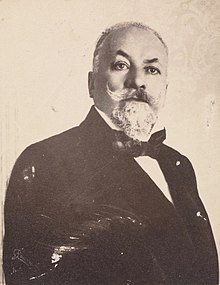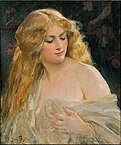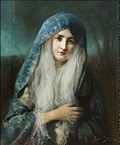| Jan Styka | |
|---|---|
 Jan Styka, 1905 Jan Styka, 1905 | |
| Born | 8 April 1858 Lemberg, Austrian Poland |
| Died | 11 April 1925(1925-04-11) (aged 67) Rome, Italy |
| Nationality | Polish |
| Known for | Painting |
| Notable work | The Racławice Panorama, 1894 Transylvania Panorama, 1897 |
Jan Styka (April 8, 1858 – April 11, 1925) was a Polish painter noted for producing large historical, battle-piece, and Christian religious panoramas. He was also illustrator and poet. Known also as a great patriotic speaker - his speeches were printed in 1915 under the French title L'ame de la Pologne (The Soul of Poland).
Biography

The son of a Czech officer in Austria-Hungary, Styka attended school in his native Lemberg (Polish: Lwów, now Lviv) then studied at the Academy of Fine Arts in Vienna, Austria following which he took up residence in Kraków in 1882 where he studied historical painting under Jan Matejko. Next he came back to Lwów and opened there a workshop. Here, together with a celebrated Polish historical painter Wojciech Kossak, they created his most famous work in Poland – The Racławice Panorama. Later he travelled to Italy for a short time before moving to France where the great art movements at Montmartre and Montparnasse were taking shape and where he would spend a large part of his life.
Among Styka's important works is the large scene of Saint Peter preaching the Gospel in the Catacombs (seen here) painted in Paris in 1902. His renowned panoramas include Bem in Siedmiogrod (1897), The Martydrom of Christians in Nero's Circus (1897), and the Wrocław Branch of the National Museum of Poland houses the monumental collaboration The Battle of Racławice painted in 1894.
Personal life
Sons Tadeusz "Tade" Styka [pl] (1889–1954) and Adam Styka [pl] (1890–1959) were both painters.
Styka died in 1925 and was buried in Rome. However, in 1959 Hubert Eaton arranged with Styka's family for his remains to be brought to the United States for interment in the "Hall of The Immortals" at Forest Lawn cemetery.
The Crucifixion

In 1910 Styka painted a portrait of esteemed pianist and Polish statesman, Ignacy Jan Paderewski, which is now at the National Museum of Poland in Poznań. Previously, near the end of the 19th century, Paderewski had commissioned Styka to paint what would become his most famous work internationally. Originally entitled "Golgotha" (the Aramaic name for the site of Christ's crucifixion), the painting became known simply as The Crucifixion. This piece is an enormous panorama standing 195 feet (59 m) long by 45 feet (14 m) in height.
The Crucifixion has a fascinating history. Upon its commission in 1894, Styka travelled to Jerusalem to prepare sketches, and to Rome, where his palette was blessed by Pope Leo XIII.
The painting was unveiled in Warsaw to great success on June 22, 1897. It was shown in many of the great cities of Europe, before making its way to America, to join the 1904 St. Louis Exposition. The painting was seized when Styka's American partners failed to pay the customs taxes, and was considered lost for nearly forty years. In 1944 the painting was found, rolled around a telephone pole and badly damaged, having languished in the basement of the Chicago Civic Opera Company for decades.
Acquired by American businessman, Hubert Eaton, the painting was restored by Jan Styka's son, artist Adam Styka [pl]. It is on display in the Hall of the Crucifixion at Forest Lawn Memorial Park Cemetery in Glendale, California.
In 2005–2006 the painting underwent a massive restoration as part of Forest Lawn's centennial celebration. It currently is shown, except on Mondays, on the hour, except 1:00 p.m., from 10 a.m. to 4 p.m.. It features a new, state of the art guided light show and narrated presentation written by biblical scholar and filmmaker Timothy Kirk.
Selected paintings
-
 Calypso
Calypso
-
 Madonna, 1906
Madonna, 1906
-
 Nero at Baiae, c. 1900
Nero at Baiae, c. 1900
-
 Rabbi with Tefillin, ca. 1925
Rabbi with Tefillin, ca. 1925
-
 Nymph and a Horse, c. 1920
Nymph and a Horse, c. 1920
-
 Portrait of Maryla Młodnicka-Wolska
Portrait of Maryla Młodnicka-Wolska
-
Death of Władysław Szujski in the Battle of Sillery
-
Kazimierz Pułaski, ca. 1925
-
Dream of Polish Volunteers in French Trenches
References
- Małaczyński, Aleksander (1930). Jan Styka (szkic biograficzny). Lwów: Drukarnia Uniwersytecka we Lwowie. p. 41.
- "Jan Styka". Retrieved 17 April 2020.
- "PANORAMA SIEDMIOGRODZKA". Archived from the original on 4 May 2013. Retrieved 17 April 2020.
- ^ "Considered Poland's greatest panorama painter, Jan Styka died 95 years ago today". Retrieved 29 April 2020.
- ^ ""Golgota" Jana Styki króluje z kalifornijskiego wzgórza". Archived from the original on 27 March 2021. Retrieved 17 April 2020.
- "Considered Poland's greatest panorama painter, Jan Styka died 95 years ago today". Retrieved 29 April 2020.
- "Golgota Jana Styki" (PDF). Retrieved 17 April 2020.
External links
- Details of the "Panorama of the Battle of Racławice" at the Wroclaw Municipality website
- Details of "The Crucifixion" at the Forest Lawn website
- Maria Styka family art
- 1858 births
- 1925 deaths
- Artists from Lviv
- Artists from the Kingdom of Galicia and Lodomeria
- Polish people of Czech descent
- 19th-century Polish painters
- 19th-century Polish male artists
- 20th-century Polish painters
- 20th-century Polish male artists
- Academy of Fine Arts Vienna alumni
- Burials at Forest Lawn Memorial Park (Glendale)
- Polish male painters
- Catholic painters